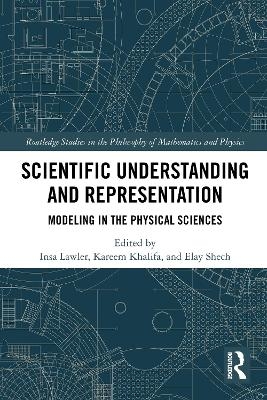
Scientific Understanding and Representation
Routledge (Verlag)
978-1-032-06581-6 (ISBN)
This volume assembles cutting-edge scholarship on scientific understanding, scientific representation, and their delicate interplay. Featuring several articles in an engaging ‘critical conversation’ format, the volume integrates discussions about understanding and representation with perennial issues in the philosophy of science, including the nature of scientific knowledge, idealizations, scientific realism, scientific inference, and scientific progress.
In the philosophy of science, questions of scientific understanding and scientific representation have only recently been put in dialogue with each other. The chapters advance these discussions from a variety of fresh perspectives. They range from case studies in physics, chemistry, and neuroscience to the representational challenges of machine learning models; from special forms of representation such as maps and topological models to the relation between understanding and explanation; and from the role of idealized representations to the role of representation and understanding in scientific progress.
Scientific Understanding and Representation will appeal to scholars and advanced students working in philosophy of science, philosophy of physics, philosophy of mathematics, and epistemology.
Insa Lawler is Assistant Professor of Philosophy at the University of North Carolina at Greensboro, USA. Kareem Khalifa is Professor of Philosophy at Middlebury College, USA. He is the author of Understanding, Explanation, and Scientific Knowledge (2017). Elay Shech is Associate Professor of Philosophy at Auburn University, USA.
1. Introduction, Kareem Khalifa, Insa Lawler, and Elay Shech; Part I: Understanding, Knowledge, and Explanation; 2. Can Scientific Understanding be Reduced to Knowledge?, Henk W. de Regt; 3. Should Friends and Frenemies of Understanding be Friends? Discussing de Regt, Kareem Khalifa; 4. Frenemies or Friends? A Reply to Kareem Khalifa, Henk W. de Regt; 5. Onwards, My Friend! Reply to de Regt, Kareem Khalifa; 6. Factivism in Historical Perspective: Understanding the Gravitational Deflection of Light, Sorin Bangu; 7. Ideal Patterns and Non-Factive Understanding, Mazviita Chirimuuta; 8. Topological Explanations: An Opinionated Appraisal, Daniel Kostić; 9. Explanatory Power: Factive vs. Pragmatic Dimension, Juha Saatsi; Part II: Understanding and Scientific Realism; 10. Understanding the Success of Science, Christopher Pincock; 11. Truth and Reality: How to be a Scientific Realist Without Believing Scientific Theories Should be True, Angela Potochnik; 12. Defensible Scientific Realism: A Reply to Potochnik, Christopher Pincock; 13. Different Ways to be a Realist: A Response to Pincock, Angela Potochnik; 14. Realism About Molecular Structures, Amanda J. Nichols and Myron A. Penner; 15. Anti-Fundamentalist Lessons for Scientific Representation from Scientific Metaphysics, Julia R.S. Bursten; Part III: Understanding, Representation, and Inference; 16. Factivity, Pluralism and the Inferential Account of Scientific Understanding, Jaakko Kuorikoski; 17. Scientific Representation and Understanding: A Communal and Dynamical View, Collin Rice; 18. Representation and Understanding are Constitutively Communal but Not Constitutively Historical, Jaakko Kuorikoski; 19. Which Modal Information and Abilities Are Required for Inferential Understanding?, Collin Rice; 20. Maps, Models, and Representation, James Nguyen and Roman Frigg; 21. DEKI, Denotation, and the Fortuitous Misuse of Maps, Jared Millson and Mark Risjord; 22. DEKI and the Mislocation of Justification: A Response to Millson and Risjord, Roman Frigg and James Nguyen; 23. DEKI and the Justification of Surrogative Inference: A Response, Jared Millson and Mark Risjord; 24. How Values Shape the Machine Learning Opacity Problem, Emily Sullivan; 25. Understanding from Deep Learning Models in Context, Michael Tamir and Elay Shech; 26. Link Uncertainty, Implementation, and ML Opacity: Some Clarifications, Emily Sullivan; 27. Expecting Too Much from Our Machine Learning Models, Elay Shech and Michael Tamir; Part IV: Understanding and Scientific Progress; 28. Understanding the Progress of Science, C. D. McCoy; 29. Scientific Progress Without Justification, Finnur Dellsén; 30. The Significance of Justification for Progress: A Reply to Dellsén, C. D. McCoy; 31. Scientific Progress without Problems, Finnur Dellsén.
| Erscheinungsdatum | 08.11.2022 |
|---|---|
| Reihe/Serie | Routledge Studies in the Philosophy of Mathematics and Physics |
| Zusatzinfo | 13 Line drawings, black and white; 7 Halftones, black and white; 20 Illustrations, black and white |
| Verlagsort | London |
| Sprache | englisch |
| Maße | 152 x 229 mm |
| Gewicht | 789 g |
| Themenwelt | Geisteswissenschaften ► Philosophie ► Erkenntnistheorie / Wissenschaftstheorie |
| Naturwissenschaften | |
| ISBN-10 | 1-032-06581-8 / 1032065818 |
| ISBN-13 | 978-1-032-06581-6 / 9781032065816 |
| Zustand | Neuware |
| Haben Sie eine Frage zum Produkt? |
aus dem Bereich


![Was heißt Denken?. Vorlesung Wintersemester 1951/52. [Was bedeutet das alles?] - Martin Heidegger](/media/113619842)